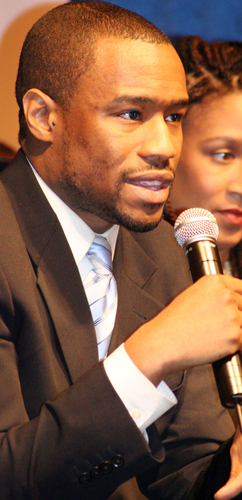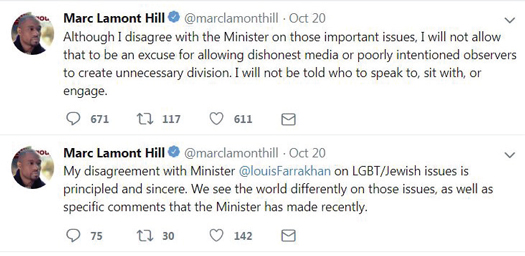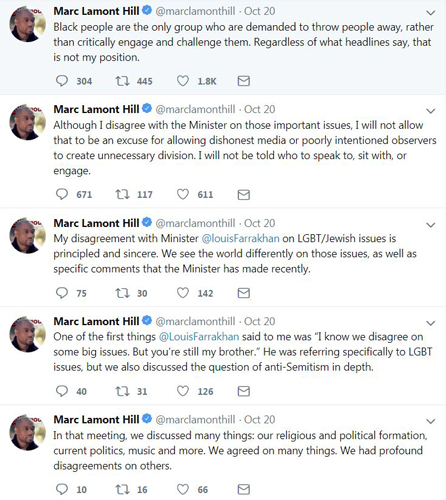Debate, Dialogue & ‘Profound Love of Black People’
By Richard B. Muhammad -Editor- | Last updated: Oct 24, 2018 - 10:20:35 AMWhat's your opinion on this article?

Marc Lamont Hill Photo: Jesse Muhammad
|
Marc Lamont Hill, author, analyst and college professor, found himself in a promo for the Honorable Minister Louis Farrakhan’s “Let’s Change the World” music project and in a controversy. He said he didn’t know he would be in promotional material for the project when he spent time listening to the music in 2016.
And, when media companies asked him about the promotion and possible violations of his contracts, major media hype was thundering around words spoken by the Minister in Detroit. Mr. Hill, a professor at Temple University, answered questions about the contracts and media ethics that prohibit him endorsing products or people he covers as an analyst and a journalist—and some questions about the Minister.
All of this became connected to, or conflated with attacks on Min. Farrakhan made by the mainstream media, White and Jewish critics of words from his message Oct. 14 to mark the 23rd anniversary of the Million Man March. There has also been a concerted anti-Farrakhan campaign raging since February that has targeted and condemned anyone who dares come near Min. Farrakhan.
With blaring media headlines, a mixture of reporting and misreporting, the Temple professor found himself besieged from all sides. That doesn’t bother him so much, but he does believe he should be understood based on his words, thoughts, and positions on public and private discourse.
But, he said, emphatically, he was unwilling to be used by those who simply want to attack Min. Farrakhan. Black folks should have the right to reason, agree, disagree and love another—just as everyone else does, he said.

|
“I have tremendous respect for the Nation of Islam, for the work that has been done. I am not embarrassed, ashamed or regretful that I met with the Minister. I have disagreements, but I also have considerable areas where we agree. Regardless of what headlines say, while I may disagree, or even at times renounce a comment or idea that I think is wrong or bad, I do not renounce him. I have never renounced the Minister or the work that the Nation has done for 88 years,” he said during an exclusive Oct. 22 telephone interview with The Final Call.
“Rather I hope that we can continue to move forward in struggle and build together, work together as a global human family. And, that only comes from dialogue, from agreement, from disagreement but it has to be anchored in a profound love for Black people and I have no doubt that Min. Louis Farrakhan has a profound love for Black people. And I have a profound love for Black people and a profound love for my dear brother.”
Prof. Hill told The Final Call a 2016 visit with the Minister at his farm in Michigan was a day spent listening to music from the CD collection, which has since been released, as well as a time for talking, exchanging ideas and even a bit of debate in the best manner.
Mr. Hill, who works for CNN, BET and other outlets, did interviews in October answering questions about the promotional materials and some questions about his position on Min. Farrakhan.
The headlines exploded with talk of his “condemnation” of the Minister and the conversation migrated into social media via Twitter. But the headlines weren’t altogether correct and did not distinguish between different intellectual and perhaps spiritual points of view and a denunciation of the Minister.
Among the different points of view, said Mr. Hill, is his position in support of LGBTQ groups and lifestyles and his view that some comments by the Minister may have veered into anti-Semitism or could be used by anti-Semites. None of these points are new and every difference on a point of public discourse has been shared with the Minister, Mr. Hill added. It’s his belief that healthy debate and honest communication are important. And, he added, his advocacy for LGBTQ organizations represents a different position, not only from the Minister, but from Believers of many faiths who see scripture a particular way.
“I do not believe the Minister or anyone in the Nation wants to do harm to (the LGBQT community),” he continued. But, his belief is that the LGBTQ community should be embraced.
Mr. Hill, who has himself been called an anti-Semite, is a self-described “fierce critic” of the state of Israel, the Israeli government and oppression of the Palestinians. He explains his criticism as not an assault on Judaism but on Zionism and denying others their rights. That has not kept him from being labeled an anti-Semite, which he agrees is an overly used term.

|
But, he said, “There have been moments where the Minister has made statements or comments that I disagree with because of the impact and the effect I think it could have on the general public. And, it’s important that I stress that I have disagreed with comments that the Minister has made. And I think that is substantively different than attacking the Minister’s spirit, heart or character, which I am not doing and will not do,” he added. “We can have a debate about whether a comment is anti-Semitic. We can disagree about whether a theory or an idea, or a particular reading of history is anti-Semitic. We can have those conversations and I am open to having those conversations.”
“Too often, the public, when it comes to Black people (others) want us to always throw everybody away rather than engage them,” he said. “But if I have a disagreement with my brother, I suddenly am not allowed to sit in the same room, have a conversation, have a cup of coffee? I think that’s unreasonable.”
While the two men had discussions into the night in 2016 in Michigan, it was not all focused on disagreements, the Temple professor noted. “The idea of creating freedom, justice and equality; of providing food, clothing and shelter for our people is something that we share. The idea of Black people caring for each other, building for each other, investing in each other and loving each other is something that we care deeply about both,” said Mr. Hill. “And, if there’s anything that we share, it’s a profound love for Black people and that’s the heart, in my estimation, of Minister Louis Farrakhan’s assignment. (The) heart of the Nation of Islam’s structure has been a profound love of Black people from 1930 to now. And, it’s a spirit that has always resonated with me, inspired me and led me. And I don’t think we can ignore those works even at the same time, I am critical and in disagreement with these issues.”
And, Mr. Hill added, when the two first met, the Minister shared how they did not agree on everything but there was brotherly love between them. “That matters,” he said.
Does he believe the Minister is an anti-Semite? “I believe that the Minister has a profound love for the entire human family. I do not believe, based on my understanding and my reading of anti-Semitism, that he is an anti-Semite. I do believe that he has made comments that I have found to be anti-Semitic, and I think that is why it’s important to have those conversations because we can differ on policy and we can differ on ideology, we can differ on tactics; and I think that there have been moments,” he said.
“To me when you say someone is ‘anti-Semitic,’ you are saying they have a particular investment in doing harm to Jewish residences, to promoting narratives about them for a particular end that I don’t believe the Minister intends,” Mr. Hill continued. “So to be very clear because I don’t want to sound like I’m equivocating, I think that the Minister has said things I have found to be harmful to Jewish brothers and sisters that I would read as anti-Semitic as a comment. Do I believe that he is an anti-Semite? No.”
INSIDE STORIES AND REVIEWS
-
-
About Harriett ... and the Negro Hollywood Road Show
By Rabiah Muhammad, Guest Columnist » Full Story -
Skepticism greets Jay-Z, NFL talk of inspiring change
By Bryan 18X Crawford and Richard B. Muhammad The Final Call Newspaper @TheFinalCall » Full Story -
The painful problem of Black girls and suicide
By Charlene Muhammad -National Correspondent- » Full Story -
Exploitation of Innocence - Report: Perceptions, policies hurting Black girls
By Charlene Muhammad -National Correspondent- » Full Story -
Big Ballin: Big ideas fuel a father’s Big Baller Brand and brash business sense
By Bryan Crawford -Contributing Writer- » Full Story






 Click Here Stay Connected!
Click Here Stay Connected!








